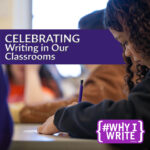 This blog post was written by NCTE member Rocio Rivas as part of a blog series celebrating the National Day on Writing®. To draw attention to the remarkable variety of writing we engage in and to help make all writers aware of their craft, the National Council of Teachers of English has established October 20 as the National Day on Writing®. Resources, strategies, and inclusion in a blog post does not imply endorsement or promotion by NCTE.
This blog post was written by NCTE member Rocio Rivas as part of a blog series celebrating the National Day on Writing®. To draw attention to the remarkable variety of writing we engage in and to help make all writers aware of their craft, the National Council of Teachers of English has established October 20 as the National Day on Writing®. Resources, strategies, and inclusion in a blog post does not imply endorsement or promotion by NCTE.
“Mija, how do you write this word in English?” asked my immigrant father. At the time, I was a third grader learning how to read and write in English myself. Yet, I vividly remember the happiness I felt when helping my father translate his writing. Through his written words, he advocated for our family and navigated complex power structures. At this tender age, I learned the power and joy that writing could illuminate within our lives. As a student, writing gave me a space to wonder and form meaningful interpretations about the world. Now, as an educator, I develop young writers through thought-provoking quick writes, identity prompts, and emerging multimodal writing genres.
In our ninth-grade ELA classroom, we value our individualized lived experiences and share them through our writing community. We like to start our class with quick writes from mentors such as Poet Ali, Jamila Lyiscott, Usman Hameedi, and Rudy Francisco that prompt self-discovery. Writing prompts such as “What is a part of yourself that tells the story of your life?” and “What do you think makes someone ‘articulate’? What flavors of English do you speak?” initiate compelling reflections. The magic from our quick writes blooms when we share a golden line from our writing and honor our voices. Over time, students begin to feel more comfortable with each other and become vulnerable with their writing. In short, this establishes our writing community from the start and encourages a diverse exchange of perspectives.
Additionally, many of our writing assignments elicit identity analysis work that is crucial for an adolescent’s self-esteem, self-concept, and growth mindset. For example, students created podcasts examining three identity factors and their position in society. Inspired by Dr. Jessica Early’s Next Generation Genres (2022), this podcast challenges students to explore new craft structures, creative autonomy, and individualized author’s voice. Though a spoken piece, students prepared an outline and script prior to recording. Students wrote about identity factors they felt were significant, like special interests, sports, music, culture, parents, languages, education, literacy experiences, etc. With a few mentors such as Radio Rookies and On Purpose with Jay Shetty, students adopted new writing styles and voices. The exploration of these writing genres helps students develop writer identities outside of traditional formulaic writing tasks.
The final podcasts beautifully represented the expression of self. The takeaways from this project were fascinating and reaffirmed that writing can ignite the joy of writing. One student wrote “I liked [this project] because I was able to show the side of me that people don’t know about.” Another noted that “I liked being able to share some stuff about myself that I probably wouldn’t have if it wasn’t for [this project.]” The podcasts were deeply personal and provided students the space for their authentic identities to shine. These reflections highlight the transformative experiences that writing can elicit for adolescents.
Ultimately, writing is an important part of life. Writing evokes joy, creativity, imagination, meditations, agency, resilience, love, peace, and community. As one student remarked, “I like writing because I can pore all my emotions and how I feel about certain things.” These words suggest that writing can provide students with a limitless outlet to express themselves and conceptualize their world. Today, I write this post to celebrate the National Day on Writing and the extraordinary discoveries that come from student writing. As researchers and practitioners, let’s continue to create opportunities for students to explore themselves and their world through the magical joy of writing.
 Rocio Rivas draws on her five years of expertise as a ninth-grade English teacher in an urban high school to focus on student engagement, motivation, culturally sustaining practices, and empowering writing practices for the new generation. She earned her BAE and MEd at Arizona State University and is a 2024 recipient of the NCTE Early Career Educator of Color Award.
Rocio Rivas draws on her five years of expertise as a ninth-grade English teacher in an urban high school to focus on student engagement, motivation, culturally sustaining practices, and empowering writing practices for the new generation. She earned her BAE and MEd at Arizona State University and is a 2024 recipient of the NCTE Early Career Educator of Color Award.
It is the policy of NCTE in all publications, including the Literacy & NCTE blog, to provide a forum for the open discussion of ideas concerning the content and the teaching of English and the language arts. Publicity accorded to any particular point of view does not imply endorsement by the Executive Committee, the Board of Directors, the staff, or the membership at large, except in announcements of policy, where such endorsement is clearly specified.



